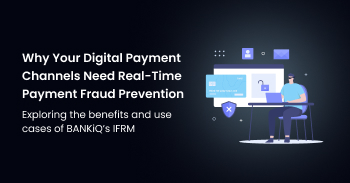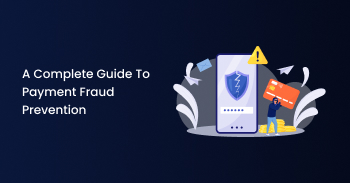Introduction
In an era where digital transactions are the norm, the spectre of fraud poses a significant threat to financial systems and personal security. Recent data from the Federal Trade Commission highlights the urgency of addressing this issue, showing that in 2023, 2.6 million consumers reported being victims of fraudulent activities, resulting in reported losses exceeding $10 billion. This surge underscores the pressing need for robust strategies to combat fraud, which is evolving in sophistication.
To address this challenge, businesses, financial professionals, and individuals must stay informed and vigilant. This guide delves into the world of fraud, equipping you with the knowledge to detect, prevent, and mitigate these threats effectively. Fraud risk management is crucial for sustained business growth and customer trust, requiring proactive measures to combat evolving fraudulent tactics.
Common types of fraud in digital transactions
Vishing (Phone Call Scam): Vishing directly targets individuals using phone calls to extract sensitive information, compromising the security of their digital transactions.
Phishing (Email Scam): Phishing emails deceive users into providing personal information or clicking on malicious links, leading to unauthorized access to their digital accounts.
Do you want to face the same fate as Indian investors targeted by Chinese cybercriminals? Recently, these criminals used fake brokerage apps to trick investors into providing personal and financial information, leading to unauthorized access to their accounts. This phishing scam highlights the risks of interacting with unfamiliar emails or apps. Staying vigilant, with the assistance of a fraud prevention platform, helps safeguard organizations from threats and fraudulent scams.
Spear Phishing (Targeted Email Scam): Spear phishing targets specific individuals or organizations, tricking them into divulging confidential information that can be used to commit fraud in digital transactions.
SIM Swap (Mobile Number Scam): SIM swap fraud allows attackers to gain control of a victim’s phone number, enabling them to bypass security measures and conduct fraudulent transactions.
Could you imagine losing lakhs from your bank account like a Delhi advocate who fell prey to ‘SIM swap fraud‘? This scam lets attackers take control of your phone number, bypass security measures, and conduct fraudulent transactions. To avoid such attacks, it’s crucial to safeguard your personal information and stay vigilant against suspicious activities.
Smishing (SMS Scam): Smishing uses text messages to deceive users into clicking on links or providing information, compromising the security of their digital transactions.
What does fraud risk management encompass?
Fraud risk management is a comprehensive and proactive approach to mitigating fraud within an organization. It involves embedding strategies that include robust internal controls, investments in anti-fraud technology, and an understanding of the current and future fraud landscape. This holistic strategy aims to prevent potential incidents that could hinder the organization’s core objectives and goals. By recognizing the nature of these potential occurrences and implementing mitigation measures, organizations can protect themselves from the adverse impacts of fraud, including financial, operational, and reputational harm.
The importance of compliance in mitigating fraud and risk
Regulatory requirements: Fraud risk compliance solutions ensure that businesses adhere to relevant laws and regulations, which often include measures to prevent fraud and protect consumers.
Risk management: Compliance and fraud management frameworks often include risk assessment and management practices that help identify and mitigate potential fraud risks.
Trust and reputation: Fraud risk compliance services help build trust with customers and stakeholders by demonstrating a commitment to ethical business practices, reducing the risk of fraud-related incidents.
Financial stability: Compliance with financial regulations can help prevent financial penalties and legal actions that may arise from non-compliance, ensuring the organization’s financial stability.
Competitive advantage: Compliance with industry standards and regulations can give businesses a competitive edge by demonstrating reliability and security to customers.
The recent decision by the central bank to bar one of the leading payment aggregators from accepting new deposits underscores the importance of regulatory compliance in the financial sector. Citing persistent non-compliance and continued material supervisory concerns, the regulatory action highlights the necessity for companies to adhere strictly to regulatory guidelines. This development serves as a reminder of the significance of robust compliance mechanisms in ensuring the stability and integrity of the financial system.
Risk and compliance management with BANKiQ FRC
BANKiQ FRC is an advanced solution that leverages real-time, cognitive ML technology to revolutionize fraud risk and compliance management for digital payment facilitators. It provides a comprehensive suite of features, including seller onboarding monitoring, transaction payment monitoring, suspicious transaction reporting (STR), and complete fraud management. This solution is designed to meet the specific needs of acquiring financial institutions, offering access portals pre-packaged with STR and bank fraud policies and scenarios, along with fraud management reports and dashboards.
Advanced alert handling and queue management:
BANKiQ FRC excels in managing alerts and queues, offering sophisticated tools for investigators. Its capabilities enable a thorough examination of suspicious activities by connecting various transactions and activities. Through innovative linking features like One-to-Many and Many-to-One, the solution ensures a comprehensive investigation process. Furthermore, it can analyze events such as reversals, returns, and refunds against carefully curated metrics, providing invaluable insights into evolving fraudulent patterns over time.
Machine learning capabilities:
One of the standout features of BANKiQ FRC is its advanced machine learning capabilities. These capabilities enable the system to identify fraudulent activities that may go unnoticed by human monitoring. By leveraging machine learning, the solution can detect and prevent fraud proactively. Additionally, it offers portal access to acquiring banks and top merchants, empowering them with tools to combat fraud effectively.
Deep identification and understanding of fraud risks:
BANKiQ FRC goes beyond traditional fraud and risk management by focusing on the deep identification and understanding of fraud and misconduct risks. This approach allows organizations to gain collective insights into fraud risks, enabling them to design and evaluate controls more effectively. By understanding these risks, organizations can prevent, detect, and respond to fraud and misconduct efficiently, safeguarding their business objectives.
Robust design for compliance programs:
The solution’s robust design enables the implementation of effective fraud risk compliance solutions for digital payments and antifraud controls. It ensures that organizations meet industry standards and reduce exposure to corporate liability, sanctions, and litigation. Additionally, BANKiQ FRC offers scope for innovation, allowing for customization with minimal disruptions to payment infrastructure.
Cost-effective and quick implementation:
BANKiQ FRC stands out as a cost-effective solution with the lowest total cost of ownership (TCO) in the market. Its quick implementation process, with a Time to Value of under 3 months, makes it an attractive choice for organizations looking to enhance their fraud risk and compliance management capabilities efficiently.
Summing up
Digital payment fraud prevention in today’s digital era is an ongoing challenge that requires a multifaceted approach. In 2024, businesses must prioritize the implementation of robust security measures, such as biometric authentication, AI-powered fraud detection, and blockchain technology, to protect against evolving threats. Additionally, fostering a culture of compliance and regular auditing of transaction processes are crucial for staying ahead of regulatory requirements. By adopting a comprehensive strategy that combines technological innovation with proactive compliance practices, organizations can effectively secure their digital transactions and safeguard their reputation and financial well-being.
Protect your digital transactions with BANKiQ’s advanced fraud prevention solutions. Schedule a demo today to see how we can safeguard your business from fraudsters.
By BANKiQ





